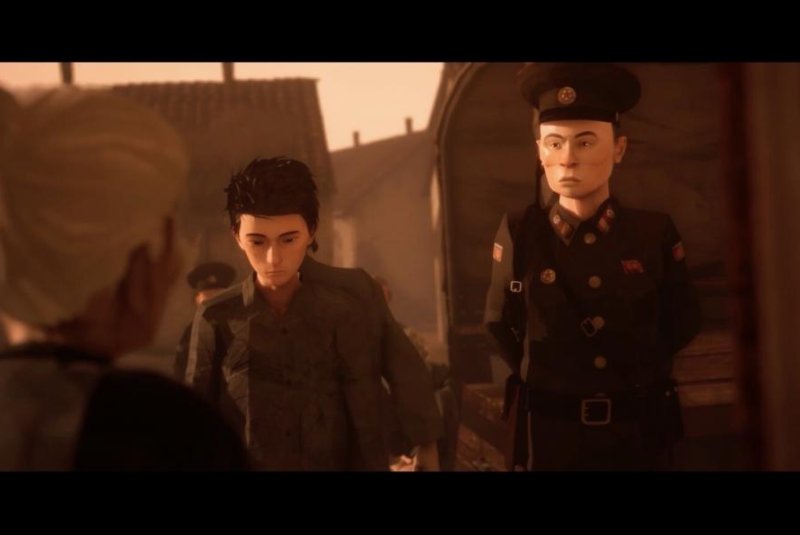True North, an animated film by Eiji Han Shimizu, depicts life inside North Korea's brutal political prison camps. Photo courtesy of Eiji Han Shimizu
SEOUL, Oct. 30 (UPI) -- True North, by director Eiji Han Shimizu, is an animated film, but its subject matter -- North Korea's brutal political prison camps -- is deadly serious.
The film, which had its South Korean premiere last weekend at the Bucheon International Animation Festival outside Seoul, follows the story of 9-year-old North Korean boy Yo-han and his family as they are whisked away in the middle of the night without explanation by secret police.
They are sent to one of the country's notorious political prison camps, where emaciated prisoners eat grass to survive, slave in filthy coal mines, are beaten and raped by guards and are executed for trying to escape. The stories in True North were based on the testimonies of survivors from the camps.
Japanese director Shimizu, who is of Korean descent, said he chose animation as a way to deliver an emotional impact to audiences that would resonate beyond reports by human rights organizations such as Amnesty International.
"When you go to conferences about North Korean human rights abuses, you end up reading a thick report full of facts and statistics," he said via a Zoom conference call from Japan after the screening.
"Certainly, these things are very important...but I realized these efforts were kind of getting stagnant," he said. "It's not reaching people, it's not creating enough movement around the world. I'm from Japan and grew up watching lots of animation and reading manga. I thought it would be important to tell these difficult stories through a very accessible medium such as animation."
Shimizu said he came to the material after reading an account by a survivor of one of the prison camps that was given to him by a friend. The story triggered a memory he had as a young child, when one of his grandparents told him if he had misbehaved that he'd be sent to a North Korean camp.
"Until I was much older, I didn't know anything about North Korean political prison camps, but I grew up knowing there was this very scary place," he said. "When I read the book that my friend gave me, it brought up that old memory. I had been looking for a project to work on, and then I realized -- maybe this is my calling."
The film, which was produced in Indonesia using 3D computer animation, creates a vivid depiction of a horrifying world that has rarely been seen outside North Korea.
A 2014 Commission of Inquiry report by the United Nations estimated that up to 120,000 prisoners are being held in political camps in North Korea. It documented crimes against humanity, including torture, rape, execution, deliberate starvation and forced labor that were "without parallel in the contemporary world."
North Korea denies the existence of such camps. However, human rights groups continue to report on widespread abuses in prisons and throughout society, despite a period of détente with the United States and South Korea that began in 2018.
"When it comes to North Korean issues, we have heard the horrendous stories, but using animation and attaching human faces, a human world, to these stories -- I'm hoping that people are moved emotionally, not just intellectually," Shimizu said.
Ji Seong-ho, a North Korean defector who was elected to South Korea's parliament in April, attended the film's debut screening at the Bucheon festival and said it captured the reality of experiences in the secretive authoritarian state.
"It was not an exaggeration," Ji told UPI. "Things can be even worse [in the camps] than were shown in the film."
Ji, who was a guest at U.S. President Donald Trump's State of the Union address in 2018, said details in the film accurately depicted life in North Korea, even for those living outside prison camps. He pointed to a scene of a mother giving her own scant rations of food to her starving children, who lick the plates for every last morsel, as a vivid example.
The film "is very important," he said. "It touches on all aspects of human rights in North Korea: children's rights, treatment of women, freedom of religion."
Ji was an activist before becoming a politician, and remains an outspoken critic of the Kim Jong Un regime. However, he said the film inspired him to renew his efforts on behalf of his fellow North Koreans.
"The movie made me think: What am I doing for North Koreans right now?" he said. "Am I doing the best I can do for them right now?"
True North is slated for a theatrical release in Japan in 2021. It has been screened at film festivals in Nashville; Warsaw, Poland; and at the Annecy International Film Festival, one of the world's most important animation showcases. However, the COVID-19 pandemic this year has caused most festivals to be held online, making distribution deals hard to come by.
Shimizu said he is still hoping to find an international distributor for the film, which features voices dubbed in English, in order to have the greatest impact possible.
"The reason why I chose to use English as the language of the film is that I wanted to appeal to the widest possible audience," Shimizu said. "And I wanted to reach out to the most politically influential group of people -- people in North America."















